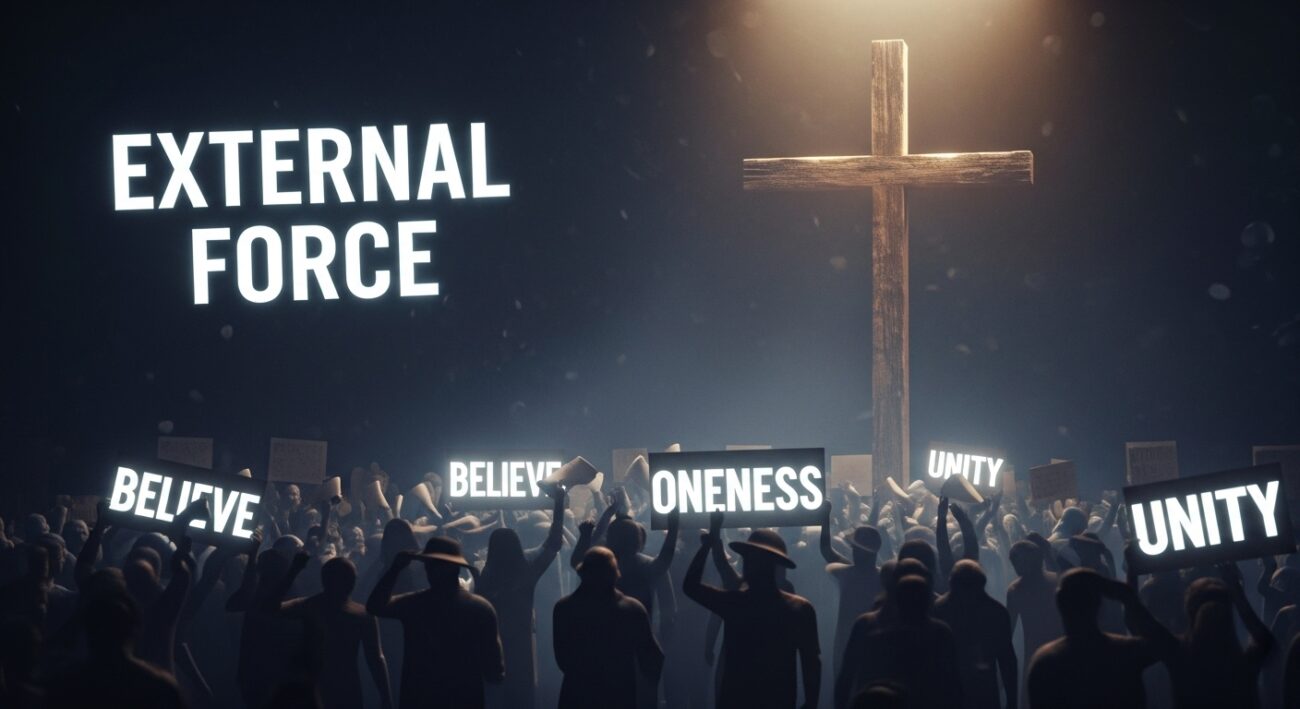Introduction: Navigating Perplexing Times
We’re living in perplexing times: many believers are awakening to the spiritual realities around us, yet simultaneously, countless others are being subtly influenced by an ‘external force’ that molds perceptions and agendas. This article offers a balanced exploration of these unseen influences that shape our world, without denying God’s ultimate sovereignty.
Yes, He is in control of all things (Romans 8:28), but remember, His providence often includes trials that ‘test’ and ‘try’ our allegiance to Him (James 1:3). If you’re noticing more chaos and hearing frequent calls for ‘unity in Christ,’ pause and ask: How are you discerning if that call is genuinely from God? Let’s dive in and test everything against Scripture (1 Thessalonians 5:21).
In the wake of Charlie Kirk’s tragic assassination on September 10, 2025, and the subsequent memorial service that drew global attention, a web of concerns has emerged about the intersection of faith, politics, and theology in conservative Christian circles. Kirk, founder of Turning Point USA (TPUSA), evolved from a secular conservative activist to a figure deeply embedded in Christian nationalist rhetoric, platforming ideas from the New Apostolic Reformation (NAR) without formal affiliation.
His legacy highlights a broader pattern: sincere believers being co-opted by subtle influences that prioritize cultural dominion over the core gospel message. This article explores these concerns, framing them around an “external force”—spiritual deception—that molds views invisibly, as critiqued in analyses of dominion theology and Christian nationalism. Drawing from scriptural warnings and recent critiques, we unpack how this force operates, often undetected, shifting the spotlight from Christ’s cross to societal control.
Kirk’s Informal Ties to NAR and the Seven Mountains Mandate
Charlie Kirk was not listed as an NAR apostle, but his collaborations amplified its core doctrines. The NAR, a loosely organized charismatic movement, promotes the “Seven Mountains Mandate,” urging Christians to conquer societal spheres like government, education, and media to establish God’s kingdom.
Kirk hosted figures like Lance Wallnau, who coined the mandate, in interviews and events, including a 2024 podcast on “Project 81” to rally evangelical votes for Trump. Wallnau, viewing politics as spiritual warfare, appeared multiple times on Kirk’s show, framing Trump as divinely anointed.
Paula White, Trump’s spiritual advisor and prosperity gospel proponent linked to NAR through kingdom advancement teachings, shared a decade-long friendship with Kirk, including joint prayer sessions and support at Trump rallies. Connections to Bill Johnson of Bethel Church were minimal pre-death, limited to post-assassination tributes praising Kirk’s boldness.
Other NAR-adjacent figures, like Sean Feucht and Rob McCoy, co-hosted rallies and launched TPUSA Faith in 2021, mobilizing campuses as “battlegrounds” for biblical values.
Critics like rhetoric expert Matthew Boedy argue Kirk repackaged NAR themes for a populist audience, translating “weird, wonky theology” into accessible activism. This made dominionism appealing to young conservatives, framing elections as apocalyptic clashes between good and evil, potentially radicalizing followers. Kirk’s unwitting role as a “branch” for the education and politics “mountains” amplified these ideas via TPUSA’s 3,000+ campus chapters and voter drives, blending faith with partisanship.
Critiques of the Memorial Service: Fragmented Gospel Amid Political Fervor
The September 21, 2025, memorial at State Farm Stadium exemplified these tensions, blending worship, tributes, and politics. While praised as a revival by some, like Albert Mohler, critiques highlight confusing gospel presentations.
Apologist Frank Turek emphasized atonement but omitted Christ’s bodily resurrection, essential for hope (1 Corinthians 15:1-19). Secretary of State Marco Rubio delivered a clear call to surrender but failed to disclose Catholic teachings on sacraments as necessary for salvation, potentially misleading Protestant audiences.
Other speakers, like Pete Hegseth and Stephen Miller, framed politics as spiritual warfare, urging an “armor of God” fight against evil. Amid MAGA chants and venomous rhetoric, gospel elements felt scattered, requiring attendees to “string pieces together.”
Erika Kirk’s forgiveness of the assassin stood out as a genuine embodiment of gospel grace, contrasting the event’s partisan tone. Historians like John Fea argue this context risks idolatry, where nationalism overshadows the Beatitudes’ emphasis on mercy and peace.
The External Force: Spiritual Deception at Work
These concerns point to an unseen external force—spiritual deception—that subtly shapes views, as described in critiques of dominion theology. This force, often linked to Satanic influence, doesn’t deny Jesus but redirects focus to power, trading the cross for a sword and the gospel for conquest.
In Christian nationalism, it’s seen as demonic doctrine, confusing God’s kingdom with human rule. Scriptural warnings abound: the serpent’s craftiness corrupting minds (2 Corinthians 11:3), false teachings for itching ears (2 Timothy 4:3-4), and hollow philosophies (Colossians 2:8).
One common question in this context is whether God is the one who raises up leaders. The answer is yes, of course He does—Scripture clearly states that there is no authority except that which God has established (Romans 13:1), and He changes times and seasons, removing kings and setting up kings (Daniel 2:21).
Yet, God also calls us to discern who and why He has placed certain ones in power, even if they serve as instruments for judgment or testing (Hosea 8:4 contrasts human-appointed leaders with God’s will). To hold to just God placing leaders into power and think nothing more would erase all the warnings in Scripture to discern the times, be wary of false gospels, and test every spirit (1 John 4:1; Matthew 24:11; 2 Peter 2:1-3).
This discernment is crucial, as false prophets and teachers will arise, misleading many with lies not appointed by God (Jeremiah 14:14; Deuteronomy 18:20).
Dominionism’s resurgence, tied to NAR and events like the 2024 “Million Women” rally, frames politics as warfare against demonic forces, anointing leaders like Trump with divine sanction. Surveys show many adherents view electoral outcomes as ordained by God, blurring spiritual and political realms.
This deception operates through urgency, sound-alike vocabulary (e.g., “save America” masking territorial theology), and mass assumptions, co-opting believers into agendas treating the Great Commission as takeover.
Implications and Call for Discernment
This force molds views across spectrums, left and right, urging testing against the apostolic gospel (Acts 20:24-27). Kirk’s story illustrates how external influences can co-opt without denial of faith, quietly shifting to control.
The memorial’s blend risks diluting the message, but moments like Erika Kirk’s forgiveness remind of true power in grace. Believers must anchor in Scripture, resisting subtlety that elevates human institutions over Christ’s kingdom, while exercising wisdom and discernment as the fear of the Lord is their beginning (Proverbs 1:7).
Key Figures and Concerns Table
| Key Figure | Connection to Kirk | NAR/Dominion Tie | Concern Raised | Supporting Scripture |
|---|---|---|---|---|
| Lance Wallnau | Multiple interviews, co-headlined events (e.g., 2024 rallies) | Coined Seven Mountains; spiritual warfare rhetoric | Repackaging dominion for populism, framing elections as apocalyptic; potential radicalization. | Matthew 24:11 (false prophets mislead many). |
| Paula White | 10+ year friendship, joint prayers, Trump circle support | Prosperity gospel, kingdom advancement; dominionist leanings | Unwitting extension of politics mountain via voter mobilization; blending faith with power. | 2 Peter 2:1-3 (false teachers bring destructive heresies). |
| Sean Feucht | Co-hosted 2023 capitol rallies | Advocates God “writing laws”; worship as protest | Amplifying apocalyptic framing in government sphere. | Jeremiah 14:14 (prophets lying in God’s name). |
| Rob McCoy | Launched TPUSA Faith 2021; ongoing partnerships | Views America as Christian nation; church mobilization | Bridge for education/politics mountains, shifting to activism over evangelism. | 1 John 4:1 (test the spirits). |
| Frank Turek (Memorial) | Mentor; spoke on atonement | Evangelical apologist | Omitted resurrection, fragmenting gospel hope. | 1 Corinthians 15:1-19 (resurrection essential). |
| Marco Rubio (Memorial) | Clear salvation call | Catholic soteriology | Undisclosed sacramental role, risking confusion on faith alone. | Romans 13:1 (God appoints authorities, but discern). |
Conclusion
In conclusion, recognizing this external force calls for humility and Scripture-centered discernment, ensuring movements align with Christ’s finished work rather than human dominion. This includes acknowledging God’s sovereignty in appointing leaders while actively heeding calls to evaluate their fruits and teachings against biblical truth.

